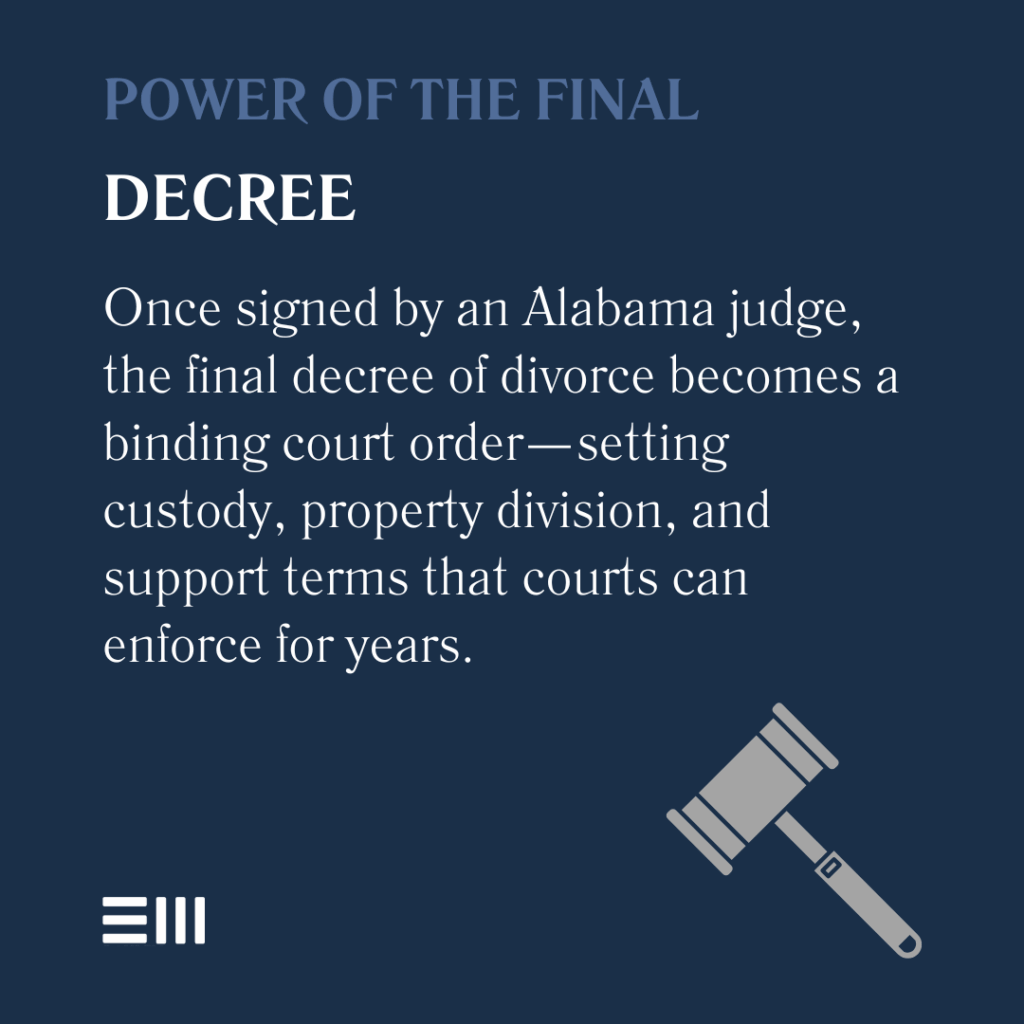
The moment a judge’s signature hits that final page, years of marriage transform into binding legal obligations that will govern your life for decades to come.
That single document determines where your children spend Christmas, who keeps the house, and how much of your paycheck goes to support…details too important to rush through or misunderstand.
In Alabama, once that decree is entered, changing its terms requires proving substantial changes in circumstances, a legal standard that makes getting it right the first time essential.
Understanding the Final Decree of Divorce
A final decree of divorce represents the culmination of the entire divorce process in Alabama. This legally binding court order officially dissolves your marriage and establishes the terms that both parties must follow moving forward.
The document serves multiple purposes beyond simply ending the marriage—it provides a comprehensive framework for how former spouses will interact, particularly when children are involved, and becomes an enforceable contract that courts can use to compel compliance if either party fails to meet their obligations.
Key Components of a Final Decree
The final decree addresses every aspect of dissolving a marital partnership. Each section carries significant legal weight and creates specific obligations for both parties.
#1: Property Division
Property division provisions detail how marital assets and debts will be distributed, including real estate, vehicles, retirement accounts, and personal property.
The decree specifies which party receives each asset, required transfers, and deadlines for completion. It also assigns responsibility for marital debts, including mortgages, credit cards, and loans.
#2: Child Custody and Visitation
For divorces involving children, the decree establishes legal custody (decision-making authority) and physical custody (where children live).
It outlines specific visitation schedules, holiday arrangements, and protocols for exchanging children. The decree may also address relocation restrictions and requirements for notifying the other parent about significant decisions.
#3: Financial Support Obligations
Support provisions encompass both child support and alimony. The decree specifies payment amounts, due dates, duration, and methods of payment.
For child support, it includes provisions for health insurance, medical expenses, and educational costs. Alimony sections detail the type of support and conditions for modification or termination.
Each component requires careful review to ensure accuracy and completeness before the decree becomes final.
The Legal Significance of the Final Decree
The final decree carries the full weight of a court order in Alabama. Once entered by the judge, its provisions become legally enforceable through the court’s contempt powers.
Violating the decree can result in serious consequences, including fines, wage garnishment, or even jail time. The decree also establishes the baseline for any future modifications, requiring a showing of material change in circumstances to alter most provisions.

Common Mistakes to Avoid
Many individuals make critical errors when reviewing their final decree. Understanding these pitfalls helps protect your interests during this crucial phase.
- Rushing the Review Process – Emotional exhaustion often leads people to rush through review, overlooking important details or accepting unfavorable terms simply to end the process.
- Assuming Standard Language Is Fair – Standard provisions may not address unique circumstances in your case. Every situation requires customized language that reflects specific needs and family dynamics.
- Overlooking Future Implications – Decree provisions that seem reasonable today may create problems years later. Consider how terms will function as circumstances change over time.
- Failing to Address Ambiguity – Vague language generates future disputes. Terms like “reasonable visitation” invite disagreement and should be replaced with specific provisions.
Avoiding these mistakes requires patience, attention to detail, and often professional guidance.

Frequently Asked Questions About Final Decrees of Divorce in Alabama
Understanding common concerns about final decrees of divorce in Alabama helps individuals navigate this critical document more effectively.
How Long Does It Take to Get a Final Decree after an Agreement?
In Alabama, uncontested divorces with complete agreements typically receive final decrees within 30-60 days after filing. Contested cases may take several months. Courts must observe Alabama’s 30-day waiting period before entering any final decree.
What Happens If My Ex-Spouse Violates the Decree?
Document all violations carefully and file a contempt motion with the court. The court can order compliance, impose fines, garnish wages, or order jail time for serious violations.
Can I Write My Own Final Decree?
While Alabama permits self-representation, drafting your own decree carries significant risks. Legal language requirements and court rules create complexity that often leads to expensive problems later.
Does the Final Decree Affect My Credit?
The decree itself doesn’t impact credit scores, but its provisions can affect credit indirectly if debts aren’t properly transferred or if your name remains on accounts assigned to your ex-spouse.
What If We Reconcile after the Final Decree?
Reconciliation requires remarriage to restore marital status. The divorce decree terminated your previous marriage permanently, and any remarriage should consider addressing previous issues.
Professional review helps identify these and other potential issues before they become problems.
Why Legal Review Matters Before Signing
The complexity and permanent nature of final decrees make professional legal review essential before signing. Attorneys identify problematic provisions, ensure completeness, and verify agreements align with Alabama law.
They catch issues non-lawyers often miss, understand how courts interpret standard language, and spot missing provisions that could create future disputes.
The cost of legal review pales compared to expenses from correcting mistakes or litigating disputes arising from poorly drafted decrees.
Take Control of Your Divorce Decree Today
Your final decree of divorce will impact your life for years to come. Don’t leave your future to chance by signing documents you don’t fully understand.
Our experienced divorce attorneys here at Baxley Maniscalco provide comprehensive decree review services throughout Alabama, ensuring every provision protects your interests and complies with state law.
We identify potential problems, negotiate necessary changes, and explain complex legal language in terms you can understand.
Whether you’re concerned about custody arrangements, support obligations, or property division, our team ensures your decree serves your long-term needs.
Contact us today for a confidential consultation about your final divorce decree. Call our office or complete our online form to schedule your appointment.
Can't find what you're looking for? Search our site below.










